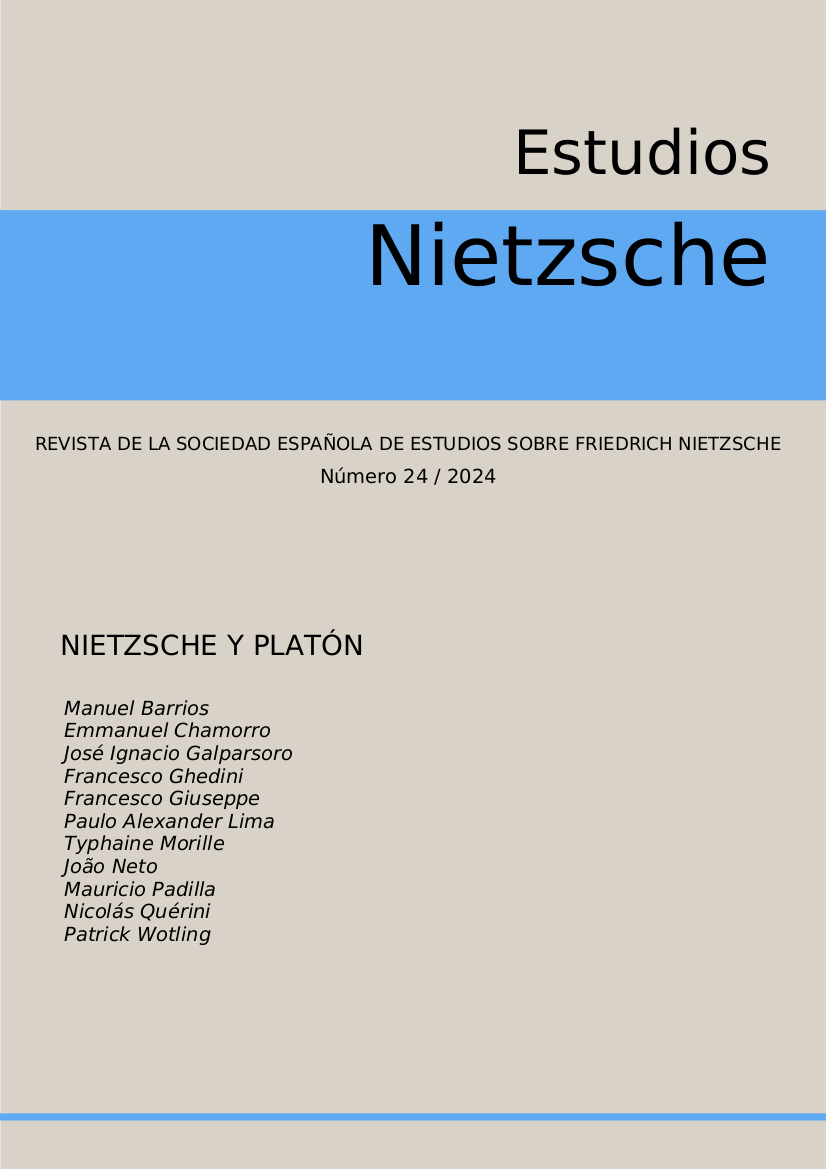Nietzsche Friend of Plato? The Courage Facing the Truth.
DOI:
https://doi.org/10.24310/en.24.2024.17879Keywords:
Nietzsche, Plato, courage, truthAbstract
Nietzsche concedes being a friend of Plato. But this friendship does not prevent him from reproaching his cowardice for having fled to the «true world». Plato thus places the truth in a field far from life, favoring the emergence of a dogmatic conception. The criticism of this conception shows that Nietzsche is more friend of the truth than of Plato. The article analyzes the Nietzschean conception of truth, characterized by its interpretive and perspectivist condition. The new friends of truth thus considered will be the philosophers of the future.Downloads
Metrics
References
Aguirre, Javier & Lavilla, Jonathan (2022). «Platón y la valentía. Laques». Madrid: Plaza y Valdés.
Aristóteles (1985). Ética Nicomáquea. Traducción Emilio Lledó. Madrid: Gredos.
Dixsaut, Monique (2015). Platon-Nietzsche, l’autre manière de philosopher, Paris : Fayard.
Duval, René (1969). «Le point de départ de la pensé de Nietzsche. Nietzsche et le platonisme», in: Revue des sciences philosophiques et théologiques, LIII, pp. 601-637.
Galparsoro, José Ignacio (1993). «Nietzsche y la teoría evolucionista del conocimiento», in: Nicanor Ursua: Cerebro y conocimiento: un enfoque evolucionista. Barcelona: Anthropos, pp. 305-336.
Galparsoro, José Ignacio (1995a). «El joven profesor Nietzsche y Platón», in: Enrahonar 24, pp. 47-72.
Galparsoro, José Ignacio (1995b). «La volonté de puissance chez Nietzsche: tentative d’une explication naturaliste du monde», in: Les Études philosophiques, Nº 4, pp. 457-480.
Gori, Pietro (2016). Il pragmatismo di Nietzsche. Saggi sul pensiero prospettivistico. Milano: Mimesis.
Griswold Jr., Charles (1986). «Philosophy, Education, and Courage in Plato's Laches», in: Interpretation. A Jourmal of Political Philosophy, 14 (2/3): 177-193.
Harris, Daniel I. (2020). «Nietzsche on Honesty and the Will to Truth», in: Journal of the British Society for Phenomenology, 51:3, 247-258.
Lázaro Carreter, Fernando (1953). Diccionario de términos filológicos. (Biblioteca Románica Hispánica, Manuales, 69). Madrid: Editorial Gredos.
Merker, Anne (2019). «Présentation», in: Nietzsche. Écrits philologiques VIII. Platon. Paris: Les Belles Lettres, pp. 19-72.
Platón (1981). La República. Traducción de José Manuel Pabón y Manuel Fernández Galiano. Madrid: Centro de Estudios Constitucionales.
Platón (1988). Fedro, en: Platón. Diálogos III. Traducción de Emilio Lledó. Madrid: Gredos.
Sánchez Meca, Diego (2009). «Voluntad de poder e interpretación como supuestos de todo proceso orgánico», in: Estudios Nietzsche, 9, pp. 105-122.
Trías, Eugenio (2001). «Un inmenso filósofo platónico», in: Estudios Nietzsche, I, pp. 169-172.
Wotling, Patrick (2006). « “L'ultime scepticisme”. La vérité comme régime d'interprétation », in : Revue Philosophique de la France et de l'Étranger, T. 196, No. 4, Nietzsche (Octobre-Décembre 2006), pp. 479-496.
Downloads
Published
How to Cite
Issue
Section
License
Copyright (c) 2024 José Ignacio Galparsoro Ruiz

This work is licensed under a Creative Commons Attribution-NonCommercial-ShareAlike 4.0 International License.
As of issue 21 (2021) this journal is published only in open access (diamond route).
From that number 21, like the previous numbers published in NIETZSCHE STUDIES, they are subject to the Creative Commons Acknowledgment-NoComercia-ShareIgual 4.0 license, the full text of which can be consulted at <http://creativecommons.org/licenses/by-nc-sa/4.0 >
It is the responsibility of the authors to obtain the necessary permissions of the images that are subject to copyright.
This work is licensed under a Creative Commons Attribution-NonCommercial-ShareAlike 4.0 International License.
Copyright generates two different rights: moral rights and patrimonial rights that EJFB recognizes and respects. Moral rights are those relating to the recognition of the authorship. They are rights of a personal nature that are perpetual, inalienable, unseizable and imprescriptible as consequence of the indivisible union of the author and his/her work.
Patrimonial rights are those that can be derived from the reproduction, distribution, adaptation or communication of the work, among others.







11.png)
